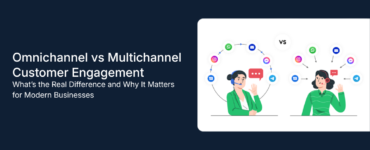In the rapidly evolving digital world, businesses face heightened consumer expectations and fierce competition. Customers now demand seamless, consistent, and personalized interactions across all communication channels. This is precisely where the concept of “omnichannel customer experience” comes into play. In this article, we’ll explore what an omnichannel customer experience entails and delve into the reasons behind its growing importance in modern businesses.
Understanding Omnichannel Customer Experience
An omnichannel customer experience (CX) refers to providing integrated, consistent, and personalized interactions across multiple channels, such as social media, mobile apps, websites, email, physical stores, and customer support. Unlike a multichannel approach, where each channel operates independently, omnichannel integrates these channels into a unified, cohesive experience. The core idea behind omnichannel CX is that customers should have the flexibility to switch between channels effortlessly, without encountering fragmented or disconnected interactions.
For instance, a customer might start their shopping journey on a company’s mobile app, continue exploring options on the website, ask questions via social media, and finally complete their purchase in-store or through an online checkout—all without losing context or continuity in their experience.
Why Is Omnichannel Customer Experience Important?
1. Enhanced Customer Satisfaction and Loyalty
Delivering a seamless omnichannel customer experience significantly improves customer satisfaction. When interactions are consistent and interconnected across all channels, customers enjoy greater convenience and reduced frustration. According to Aberdeen Group, companies offering strong omnichannel engagement retain an average of 89% of their customers, compared to 33% for those with weak omnichannel strategies.
Satisfied customers not only remain loyal but also turn into brand ambassadors, promoting the company through positive reviews and word-of-mouth referrals.
2. Improved Customer Insights
Omnichannel strategies consolidate customer data from various touchpoints, providing businesses with richer insights into consumer behavior. This integrated view enables businesses to understand customers’ preferences, buying patterns, and pain points more deeply. Consequently, brands can tailor personalized marketing messages, promotions, and customer service interactions that resonate more effectively with their audience.
3. Competitive Advantage
In today’s hyper-competitive marketplace, businesses that deliver exceptional omnichannel customer experiences differentiate themselves from competitors. Customers tend to choose brands that offer convenience, personalization, and flexibility. According to a survey by PwC, 73% of consumers rate customer experience as a critical factor in their purchasing decisions. Implementing a robust omnichannel CX strategy positions a business ahead of its competitors, driving market share and revenue growth.
4. Higher Conversion Rates and Revenue
An omnichannel approach increases conversion rates and overall revenue. Customers experiencing frictionless transitions across channels are more likely to complete purchases. According to Google, omnichannel shoppers have a 30% higher lifetime value compared to single-channel customers. Moreover, Harvard Business Review reports that customers interacting with multiple channels spend on average 4% more in physical stores and 10% more online compared to single-channel users.
5. Efficient Customer Support
An omnichannel customer experience enhances customer support efficiency. Integrated communication channels mean customer support agents have immediate access to comprehensive customer data. As a result, agents can resolve issues quickly without needing customers to repeatedly provide information. This streamlined process improves customer satisfaction while simultaneously increasing operational efficiency.
6. Future-Proofing Your Business
Consumer behavior continues to shift rapidly toward digital channels, driven by technological advancements and changing expectations. Businesses adopting an omnichannel approach are better equipped to adapt to these changes, ensuring longevity and relevance in the market. Omnichannel strategies ensure a company’s infrastructure is agile enough to accommodate emerging technologies and evolving customer demands, thereby future-proofing the business.
Implementing a Successful Omnichannel CX Strategy
To achieve success in omnichannel customer experiences, businesses must focus on several core components:
- Unified Technology Platforms: Utilize technologies such as Customer Relationship Management (CRM), artificial intelligence (AI), and data analytics to create a unified view of customer interactions.
- Consistent Brand Messaging: Ensure all channels communicate the same core brand message, maintaining consistency and trust.
- Personalized Experiences: Leverage data analytics to tailor personalized experiences, promotions, and customer interactions based on customer preferences and history.
- Continuous Feedback and Improvement: Regularly gather customer feedback across all channels to refine and enhance the customer journey continually.
Conclusion
Omnichannel customer experience is not merely a trend; it’s a fundamental shift in customer engagement strategies. By providing integrated, seamless, and personalized experiences across multiple touchpoints, businesses can significantly improve customer satisfaction, loyalty, and overall profitability. In an era where consumer expectations are continually rising, adopting an omnichannel CX approach is crucial for long-term business success and sustainable competitive advantage.




